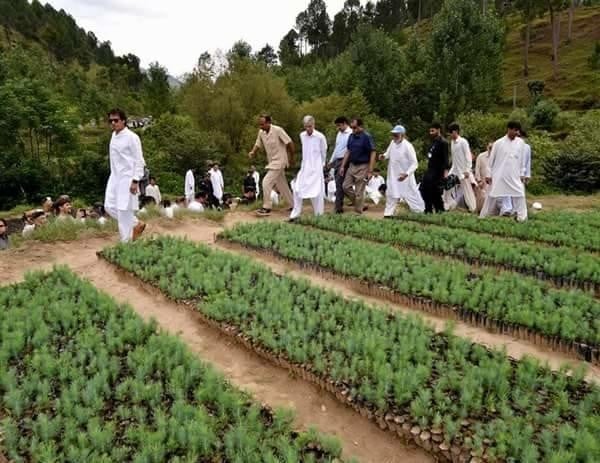
The KP government claims to have planted one billion trees that will have a huge impact on the environment and livelihood in the province

The Pakistan Tehreek-i-Insaf (PTI) government in Khyber Pakhtunkhwa claims to have achieved the target of planting one billion trees in the province in three years under its Billion Tsunami Tree (BTT) initiative.
The KP forest department believes the massive forestation campaign will not only help increase the forested areas from 20.03 to 26.5 per cent in KP but will also reduce temperature by two degrees in the coming 10 years.
"It is a significant development in the history of Khyber Pakhtunkhwa and will bring remarkable positive changes in the environment in the coming years," says Muhammad Tehmasip, project director of BTT.
The party leadership was divided over the project in the beginning. However, multiple factors convinced the PTI leadership and the government to go ahead with the project. One such factor was a report of Pakistan Meteorological Department which warned that these areas might face about 2 degrees increase in temperature and 15 per cent decline in rainfall in the southern districts of KP in the next 10 years.
There were also apprehensions that increase in temperature and fall in rain might force the residents of southern districts of KP to leave their areas and move towards the Peshawar valley and areas such as Nowshera, Charsadda, Mardan and Swabi districts as well as Malakand and Hazara regions of the province.
The government outlined BTT project’s PC-1 in November 2014 and approved Rs22 billion for its execution. The project was formally launched in June 2015.
The province was divided into three circles -- Southern Circle consisting of Peshawar, Kohat, Dera Ismail Khan, and Bannu divisions; Region-II comprising Abbottabad, and Forest Region-III comprising Malakand division.
Talking to TNS, Muhammad Tehmasip says the aim of the project is to naturally restore a previously deforested landscape. He hoped it will help meet the present and future requirements and provide various benefits for climate adaptation and mitigation in the climate-vulnerable province.
"The basic theme is to save the environment and protect the southern region from becoming a desert and then avoid exodus of the people of southern districts towards the rest of the KP areas."
Read also: Editorial
Since planting one billion trees was beyond the capacity of the forest department, it engaged the private sector. The department planted twenty per cent of the trees through labour under its supervision and gave 80 per cent of the task to the private sector.
The youth, farmers, village development committees and women were involved to achieve the forestation target. Well-established private nurseries were involved to help plant saplings mostly of local and indigenous species.
Usually, one unit was given to a small party or an individual with limited financial resources. One unit meant planting 25000 saplings.
After signing the deal, the Forest Department released Rs25000 cash through bank draft to a party for buying seeds and small plastic bags for growing saplings. The amount was given in four installments.
In one year, the grower was supposed to plant 25000 healthy plants of nine inches and as per agreement; the government purchased all the plants at the rate of six rupee per plant. And the government then provided these plants free of cost to the people for plantation in their farms and agricultural land.
Tehmasip claims that as per the PC-1, they were supposed to plant one billion trees by June 2018 at the total cost of Rs22 billion. However, he says, they achieved the target by August 2017 at the cost of Rs11 billion.
Tehmasip says, of the one billion trees, 60 per cent (600 million) saplings were planted in old degraded forests and the remaining 400 million saplings were cultivated on new sites, such as slide areas, roadsides, waterlogged areas, barren and agricultural land.
The Billion Tsunami Tree project helped the KP government not only achieve the target ahead of the deadline but also become the first member, though it is the only member of the 52 states that is a province, to achieve the target of planting trees on 60,000,00 acres of land.
Besides this, CO21 has declared KP as the "six forestry tigers." In the list, there are countries like India, China, Ethiopia and Egypt. It was BTT that also enabled the KP government to fulfill its pledge under the Bonn Challenge of planting massive trees on 348, 400 hectares.
There were some corruption charges in the BTT project as the PTI leadership in KP was accused of awarding most of the contracts of plantation to their favourites. The project director denies the corruption charges, saying a number of independent organisations constantly monitored the project and its affairs.
He said the project management unit, Forestry Planning and Monitoring Cell, Strategic Support Unit in the chief minister secretariat, etc, monitored the work besides the third party monitoring and evaluation by WWF.
About timber mafia, he says "there is zero tolerance for illegal tree cutting in KP."